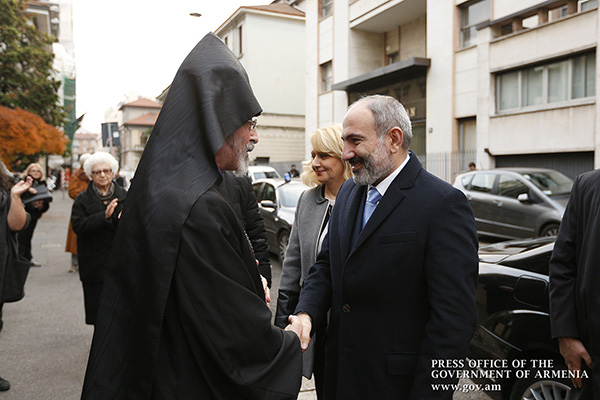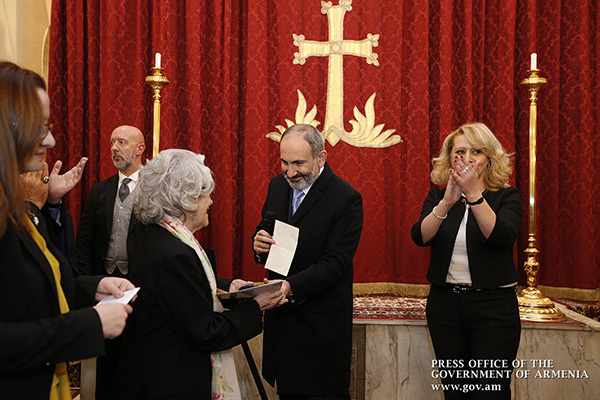As part of his official visit to Italy, Prime Minister Nikol Pashinyan today arrived in Milan, where he is scheduled to attend a series of events and meetings.
Nikol Pashinyan visited the S. Forty Martyrs’ (S. Qarasun Mankunq) Armenian apostolic church in Milan and met with representatives of the Armenian community. The Prime Minister was met by Pontifical Legate in Western Europe and Representative of the Catholicos of All Armenians in the Holy See, His Eminence Archbishop Khajag Barsamian.
After a prayer and a welcoming speech by Archbishop Khajag Barsamian, Prime Minister Pashinyan addressed the audience with greeting remarks, in which he stated:
“Your Grace,
Spiritual fathers
Dear members of the Government of the Republic of Armenia,
Dear representatives of the Armenian community of Milan,
Read also
I am very glad to meet you today. I am very glad to be here with you today. It is very symbolic that I arrived in Italy on an official visit, but I am still following a strictly Armenian agenda. We came here from Venice, where together with our delegation we visited the island of St. Lazarus, the Mekhitarist Congregation. The Armenian Apostolic Church in Milan is our second port of call. This is very symbolic indeed, because, wherever we go we see unique examples of Armenian history.
In all parts of the world, we meet with our compatriots, and as a rule, we perceive our being scattered around the world (and this is the truth) as our historical misfortune. But now, in these new times, we should try to make an asset of our historical misfortunes, since I highly value the all-Armenian potential as a constructive driving power for our people and our statehood.
The oldest church in Singapore is the Armenian Church, and I want to emphasize that wherever they landed, the Armenians promoted wellbeing, economic, cultural, scientific and educational progress in host countries, and this is perhaps the most important feature of our nation. And if we translate this into modern terminology, we can state that science, education and technology should become a key point for us in the 21st century. We must appear in such an image, first of all, before ourselves, and then before the whole world.
As His Grace spoke about changes, I remembered that 2-3 days ago I posted the Parable of the Minas from the Gospel of Luke, which I think has to do with the idea of changes.
I apologize for having to talk about the Gospel in the presence of spiritual fathers and under this roof, but I have always tried to find in the Gospel not only spiritual or religious, but also worldly meanings.
The Parable of the Minas tells as follows (I am sure you all know it very well, but let me tell you briefly in order to build my word): A man of high birth was set to leave for a far country to be invested with royal authority. He called in ten of his servants, gave them ten minas, and said, “Make them good until I come back.” When he returned, after having been invested with royal authority, he summoned the servants to whom he had given the money in order to find out how each of them had managed it.
The first came, and said, “Lord, your mina has brought back ten minas.” He said to him, “It is good, good servant; because you have been faithful. Therefore, I grant you the government of ten cities. The second came, and said, “Lord, your mina has produced five minas.” He said to him, “You, too, will be the ruler of five cities.” And another came, and said, “Lord, behold thy face, which I have kept in a linen for I was afraid of you, because you are a severe man; you take what you have not left, and you reap what you have not sown.” He said to him, “Judge you on your words, you wicked servant! You knew that I am a severe man, taking what I did not deposit, and reaping what I did not sow; why then did not you put my money in a bank, so that when I return I withdraw it with interest?” Then he said to those who were there, “Take away his mina, and give it to him who ha s the ten minas.” They said to him, “Lord, but he has ten minas.” The master replied: “I say to you, we will give to those who have, but to those who do not we will take away even what they have. For the rest, bring here my enemies, who did not want me to reign over them, and kill them in my presence.”
It is a matter of trying a change to me; I mean what happens to individuals and peoples who are afraid of change, who are afraid to take a step, who are afraid of losing what they have. This parable is precisely about it. I mean, we have always followed that very logic as we were afraid of losing. We are afraid of losing our identity, we are afraid of losing our culture, we are afraid of losing our country and, as a result, we keep losing as evidenced by our history.
This parable tells us above all that we must get rid of the status of people who do not have the status of people who always find. And for that, we should not be afraid of investing, we should not be afraid of acting; we need to bear in mind that the money invested in the parable was likely to be lost. But the Bible tells us that if we want to win, we must first of all overcome the fear of losing.
Those ten minas are the sovereign statehood we now have with God’s blessing. Behold, those ten minas represent our people’s glorious victory in the Artsakh war that came through the efforts of our freedom- fighters. And so what should we be afraid of? The question is what we have done, or what we are doing with those 10 minas!
What are we doing with our statehood, what are we doing with our victory and what have we done in the last thirty years? Let me say that there is a symbolic meaning in all this, that the people demanded their own account of the ruling political elite for thirty years and said: “We gave you ten minas, translated into the Armenian statehood. Come and give an account of what you have done with it.” The answer was as follows: “We were afraid of losing this statehood; we kept it like the biblical mina. And the people said that the privilege of governing must be restored. Our people have gone a long way on the way to victories, and the time has come to ask back the ten minas.
As a consequence, we had the events of 2018. I want to say that, for this reason too, we are not afraid of changes, because the ones made after 2018 will do no harm to our people, to the Republic of Armenia; the unity of the Armenian people will not suffer and the changes will continue.
The ten minas we have will be invested and will bring us ten more. On the Day of Judgment, we shall appear before our people and say: “We have invested the ten minas and we have earned a strong and powerful Republic of Armenia, strong and powerful education, a strong and powerful economy, a strong and powerful army. And finally, by serving the people, we have made them much more powerful, stronger and more confident.”
Your Grace,
Thank you for giving me the opportunity to say what I meant with evangelical motives.
Thank you, dear compatriots. I would like to say that I love you all, that I am proud of you and that I bow to you all. Thank you.”
After the meeting, the Prime Minister answered a number of questions relating to the reforms implemented in Armenia, development programs, domestic and foreign policies, etc.
In conclusion, the Premier handed a gold medal to Italian-Armenian writer and scholar Antonia Arslan on behalf of the Ministry of Diaspora of the Republic of Armenia for his valuable contribution to education and research.
***
Milan is considered to be the center of the Armenian community in Italy. The S. Forty Martyrs’ (S. Qarasun Mankunq) Armenian apostolic church was inaugurated as early as in 1958. It is home to the Armenian spiritual pasturage in Italy.
INFORMATION AND PUBLIC RELATIONS DEPARTMENT OF THE OFFICE OF THE PRIME-MINISTER OF THE REPUBLIC OF ARMENIA





















































